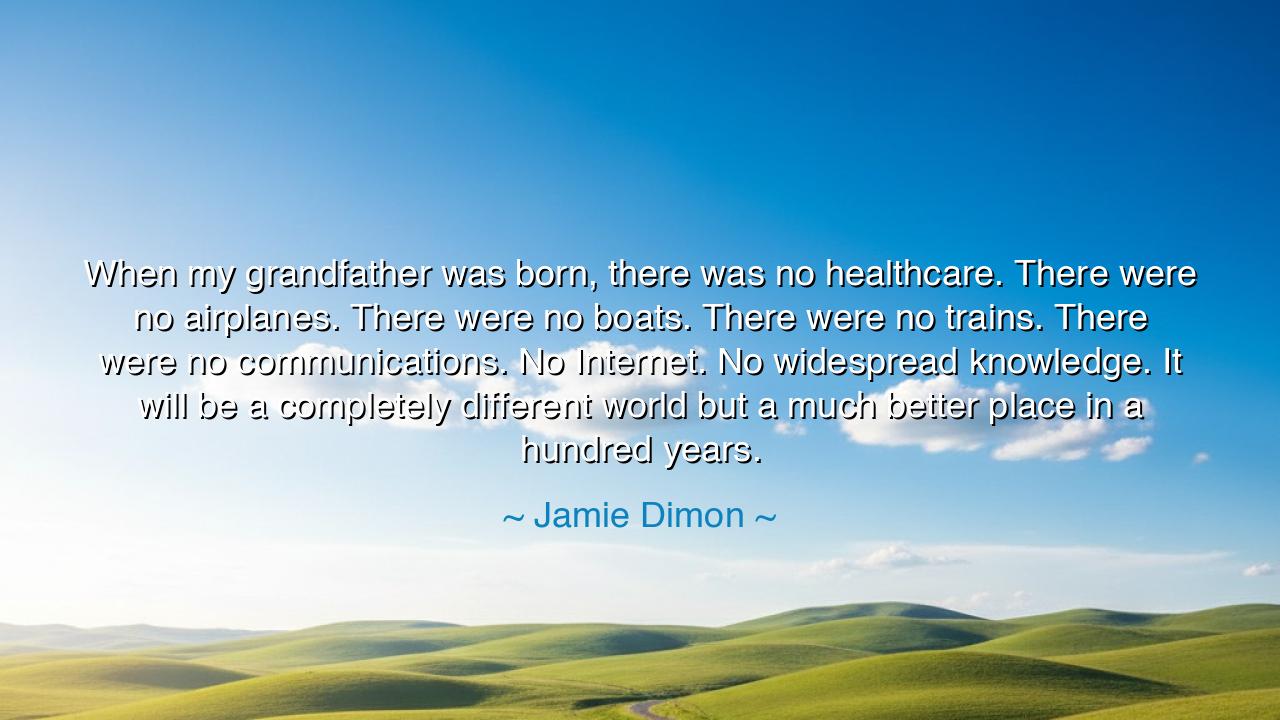
When my grandfather was born, there was no healthcare. There were
When my grandfather was born, there was no healthcare. There were no airplanes. There were no boats. There were no trains. There were no communications. No Internet. No widespread knowledge. It will be a completely different world but a much better place in a hundred years.






Hear now the words of Jamie Dimon, who looked upon the span of generations and declared: “When my grandfather was born, there was no healthcare. There were no airplanes. There were no boats. There were no trains. There were no communications. No Internet. No widespread knowledge. It will be a completely different world but a much better place in a hundred years.” These words resound with both memory and prophecy, for they remind us of the astonishing journey humankind has taken and of the promise yet to come.
When Dimon speaks of his grandfather, he recalls not merely one man’s birth but an age now passed. An era when humanity was still bound by limits, when the sick often perished for lack of healthcare, when travel across oceans and lands was slow, perilous, or impossible. He paints for us a picture of a world where the bonds of isolation were strong, where knowledge moved sluggishly from one mind to another, and where the great tools of communication that now unite us were not even imagined. His words teach us that the comforts and marvels we take for granted are but recent gifts, born from struggle and invention.
And yet, he does not stop at remembrance. He points forward, proclaiming that in another hundred years, the world will again be “completely different.” This is no lament, but a song of hope. For if a single century could bring forth airplanes that cross the skies, trains that bind nations, and the Internet that connects souls across oceans, then what wonders may the next century reveal? His faith is not blind; it is rooted in the record of human endeavor, in the truth that progress, though uneven and imperfect, is relentless in its march.
The ancients, too, once stood where we now stand. Imagine a Greek philosopher of Athens transported into the Rome of Caesar, seeing paved roads, aqueducts, and vast fleets of boats binding the Mediterranean into one. To him, this would have seemed a new world. Or think of a medieval farmer suddenly walking into the bustling cities of the Renaissance, hearing the hum of printing presses spreading knowledge at a speed never before seen. Each generation is both prisoner of its limits and heir to the triumphs of those who came before. Dimon reminds us that we are heirs to greatness, and that future generations shall inherit from us even more.
Consider also the story of the Wright brothers. When they first lifted their fragile airplane into the sky, many mocked them, saying such things could never transform the world. And yet, within a lifetime, men flew not only across continents but even beyond the earth itself. Here we see the living proof of Dimon’s vision: that what seems unimaginable today will become ordinary tomorrow. The dreams of the few become the inheritance of the many, and the limits of one age are shattered by the courage of those who dare.
The lesson, then, is clear: we must live not only with gratitude for what has been achieved, but with responsibility for what will yet be built. The Internet, the trains, the medicine, the knowledge we enjoy are not merely conveniences; they are the fruits of sacrifice, curiosity, and persistence. Just as our ancestors labored for us, so must we labor for those yet unborn, leaving behind a world brighter than the one we received.
And what must we do? We must not grow complacent. We must seek innovation with humility, pursue progress with justice, and remember always that true greatness lies not only in invention but in ensuring its blessings reach all people. Plant seeds of knowledge, support discoveries, and nurture compassion alongside technology. If we do this, then when our grandchildren look back upon our time, they too will marvel, and they too will say: “It was a different world then, but they left us a better one.”
Thus let Dimon’s words echo as both reminder and call: the world changes, the world improves, and the task of each generation is to carry the torch of progress forward. For though the tools of tomorrow may be beyond our sight, the spirit that creates them is already within us. Believe, build, and pass on the fire—and in a hundred years, humanity will stand in awe of what we dared to begin.






AAdministratorAdministrator
Welcome, honored guests. Please leave a comment, we will respond soon